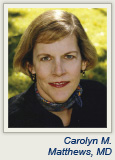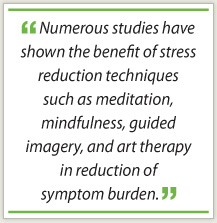Addressing a patient’s physical, emotional, and spiritual needs during the cancer journey, integrative medicine combines such time-honored therapies as nutrition, exercise, and meditation alongside allopathic approaches to cancer care, with the ultimate goal of improving survival rates and reducing symptom burden. Not an alternative to allopathic care, integrative medicine is intended to be an enhancement to each patient’s course of treatment.
Advantages
The main advantages of integrative care include:
- It has a scientific rationale (pleioptropic effects of diet and exercise on gene expression) for potential improvement in survival rates and reduction of symptom burden.
- Healthy food is a fraction of the cost of a single injection of growth factor. Why not teach patients to eat in a way that avoids the inflammatory effects of the current American diet?
- It has a high therapeutic ratio, with an extremely low likelihood of morbidity for patients. For example, it is unlikely to cause such devastating events as bowel perforation or cardiomyopathy.
- It incorporates the patient as a partner in the cancer journey and allows individuals a sense of control over their future.
Environmental-Genome Interactions
 Research is showing that most chronic conditions, from heart disease and diabetes to cancer, share underlying common pathways of inflammation and/or oxidative stress and that the manifestations of those processes are a result of each person’s unique environmental-genome interactions. While we can’t change the genes we inherited from our parents, we can optimize gene expression as a result of our daily environmental experiences—from the bioactive components in the foods we eat to limiting as much as possible our exposures to known carcinogens and infectious agents.
Research is showing that most chronic conditions, from heart disease and diabetes to cancer, share underlying common pathways of inflammation and/or oxidative stress and that the manifestations of those processes are a result of each person’s unique environmental-genome interactions. While we can’t change the genes we inherited from our parents, we can optimize gene expression as a result of our daily environmental experiences—from the bioactive components in the foods we eat to limiting as much as possible our exposures to known carcinogens and infectious agents.
In 1934, Clive McKay of Cornell demonstrated that calorie reduction prolonged life; it has now been shown repeatedly to limit tumor formation. We know that eating high glycemic index meals rapidly upregulates genes related to inflammation. The modern American diet, in which approximately 70% of caloric intake comes from refined and nutrient-poor foods, promotes hyperglycemia and hyperinsulinemia amid a background of inflammation.
Supporting Data
A randomized, placebo-controlled study investigating the effects of diet on cancer survival would be impractical, as we are not inbred lab animals with the same genes and epigenes, and it is impossible to control for years exactly what individuals and their predecessors consume. Nevertheless, there are data to support the role of diet and lifestyle in cancer patients, including the following findings:
Rowan Cheblowski’s data from the Women’s Intervention Nutrition Study (WINS) showed that in postmenopausal women with early breast cancers, a dietary invention group consuming less fat had a hazard ratio for relapse of 0.76 vs the control group (95% CI = 0.60–0.98; P = .077 for stratified log rank and P = .034 for adjusted Cox model). The effect was even greater when considering only the estrogen receptor–negative group of patients, with a hazard ratio for recurrence of 0.58.1
Dean Ornish’s groundbreaking work in men with prostate cancer has shown that intensive diet and lifestyle interventions can lead to 48 upregulated transcripts and 453 downregulated transcripts in serial prostate biopsies. He identified significant modulation of biologic processes that could affect tumorigenesis such as protein metabolism and modification, ligases, and membrane traffic proteins.2
John Pierce’s data from the Women’s Healthy Eating and Living (WHEL) trial showed a statistically significant 44% risk reduction in mortality for postmenopausal women with early breast cancer who both ate five servings of vegetables and fruits daily and walked the equivalent of 30 minutes daily for 6 days a week.3
Kim Knoops’ Healthy Ageing: a Longitudinal study in Europe (HALE study) of aging and lifestyle revealed a 60% reduction in death from cancer among 70 to 90 year olds who adhered to a Mediterranean diet and a healthy lifestyle including nonsmoking, physical activity, and moderate alcohol use.4
Effects of Exercise and Stress
 Numerous studies have now shown the benefits of exercise in prolonging cancer survival rates and promoting healthy aging. For example, Meyerhardt showed reduced mortality in patients with colorectal cancer using recreational physical activity.5 Similarly, Michelle Holmes demonstrated a statistically significant reduction in risk of death in women with breast cancer: Compared with women who engaged in less than 3 MET-hours of activity per week, the relative risk of death from breast cancer was 0.50 (95% CI = 0.34–0.74) for 9 to 14.9 MET-hours per week.6 Like diet, exercise modulates genetic expression and has pleiotropic physiologic effects.
Numerous studies have now shown the benefits of exercise in prolonging cancer survival rates and promoting healthy aging. For example, Meyerhardt showed reduced mortality in patients with colorectal cancer using recreational physical activity.5 Similarly, Michelle Holmes demonstrated a statistically significant reduction in risk of death in women with breast cancer: Compared with women who engaged in less than 3 MET-hours of activity per week, the relative risk of death from breast cancer was 0.50 (95% CI = 0.34–0.74) for 9 to 14.9 MET-hours per week.6 Like diet, exercise modulates genetic expression and has pleiotropic physiologic effects.
We also know that chronic unrelenting stress impacts not only our sense of well-being but also our immune system. As psychoneuroimmunology researchers Candace Pert and Esther Sternberg have so eloquently shown, our environmental interactions affect the function of our hypothalamic-pituitary-adrenal axis and the responsiveness of our immune system. Numerous studies have shown the benefit of stress reduction techniques such as meditation, mindfulness, guided imagery, and art therapy in reduction of symptom burden. Likewise, healthy sleep patterns are also associated with improvement in longevity and well-being.
Integrative medicine is clearly value added for our patients, and it only makes sense for oncologists to open our treatment armamentaria to these low-cost, low-morbidity approaches. ■
Disclosure: Dr. Matthews reported no potential conflicts of interest.
References
1. Chlebowski RT, Blackburn GL, Thomson CA, et al: Dietary fat reduction and breast cancer outcome: Interim efficacy results from the Women’s Intervention Nutrition Study. J Natl Cancer Inst 98:1767-1776, 2006.
2. Ornish D, Magbanua MJ, Weidner G, et al: Changes in prostate gene expression in men undergoing an intensive nutrition and lifestyle intervention. PNAS 105:8369-8374, 2008.
3. Pierce JP, Stefanick M, Flatt SW, et al: Greater survival after breast cancer in physically active women with high vegetable–fruit intake regardless of obesity. J Clin Oncol 25:2345-2351, 2007.
4. Knoops KTB, deGroot LCPGM, Kromhout D, et al: Mediterranean diet, lifestyle factors, and 10-year mortality in elderly European men and women: The HALE project. JAMA 292:1433-1499, 2004.
5. Meyerhardt JA, Giovanucci EL, Holmes MD, et al: Physical activity and survival after colorectal cancer diagnosis. J Clin Oncol 24:3527-3534, 2006.
6. Holmes MD, Chen WY, Feskanich D, et al: Physical activity and survival after breast cancer diagnosis. JAMA 293:2479-2486, 2005.
Dr. Matthews is a physician specializing in gynecologic oncology at Texas Oncology–Baylor Charles A. Sammons Cancer Center, Dallas. She is Director of Integrative Medicine at Baylor University Medical Center.

